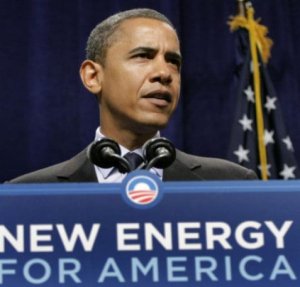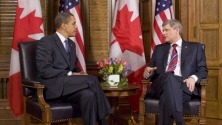As President Obama and his advisers unveil their plans for the coming term, one thing seems certain: the new administration will usher in a sea change for climate change policy in the United States. For the first time, America is led by an executive who understands the perils of climate change and is committed to doing something about it.
The President’s new energy plan is unmistakably clear: “Global warming is real, is happening now, and is the result of human activities.” Among the plan’s ambitious goals:

Barack Obama Delivers Speech on Energy Efficiency
- An 80% reduction in greenhouse gas emissions by 2050,
- A 100% auction cap-and-trade program, estimated to raise $646 billion in revenue
by 2019,
- Significant spending on alternative energy, efficiency research and implementation;
- Reengagement with the UN Framework Convention on Climate Change (UNFCCC),
- A new forum for large greenhouse gas emitters including the G-8 nations plus Brazil, China, India, Mexico and South Africa; and
- A new focus on reforestation and carbon sequestration.
Releasing this plan within his first month in office is a sure signal to the United States and to the world that confronting climate change is front-and-center of Obama’s legislative priorities. Even the $787 billion stimulus package includes several “green” provisions, with great potential to spur progress in climate change and energy research.
Climate change experts and foreign leaders internationally, however, are approaching the new administration with cautious optimism, but reporters at the December 2008 UNFCCC talks in Poland found international representatives hopeful that Obama’s “yes we can” mentality would carry over to the field of climate change. Acknowledging the higher concentration of climate skeptics in the U.S., Rajendra Pachauri, head of the Intergovernmental Panel on Climate Change, nonetheless said, “What’s happened in this country in the last two years is encouraging. The president is now strongly interested in this issue. Congress is dominated by Democrats who are also interested.” Foreign leaders, many of whom have taken political risks such as Mexico’s pledge to halve its emissions, will surely expect the U.S. to follow suit.

Barack Obama Meets with Canadian Prime Minister Stephen Harper
International outreach and collaboration are indeed on the current Administration’s agenda. Obama met with Canadian prime minister Stephen Harper in February to discuss climate change and Canada’s controversial plans to exploit their oil sands. Secretary of State Hillary Clinton, in her “maiden voyage”, met with counterparts in China and emphasized cooperation on climate change and clean energy, especially considering the United States and China combined emit approximately 40% of the world’s total greenhouse gases. Grist’s environmental blog highlights a roundup
of the administration’s efforts to date, prospects for future climate change policy, and analyses of obstacles as well as allies in the House, Senate, industry and nonprofits.
To our international readers, what seems to be the general consensus regarding the U.S. Administration’s energy policy and Clinton’s visits to Japan, China, South Korea, and Indonesia? What strategies should the Administration pursue to mitigate climate change, and how can the Administration integrate efforts into those of the international community?



Last Friday I attended a climate change forum sponsored by Hitachi with panels organized by the American Association for the Advancement of Science and The Brookings Institution.
Amid the sobering statistics, projections and political assessments of the expert panelists, we were treated to a passionate speech by Senator John Kerry, Chairman of the Foreign Relations Committee of the United States Senate.
He reminded everyone that his own interest in the environment started soon after his return from Vietnam when he became involved in Earth Day in 1970. He called for an end to procrastination over measures to decrease carbon emissions and ensure that policy is driven by science and based on facts.
Refreshing!
Linda
In my personality opinion, carbon emission becomes very complicated issue in the world now. Although It has been an out come of industried countriese, developping countries could not be able to get the consensus with the developped ones. The reasons related not only in the economics field but also the political one. I think, the economic field is very dificult to acess corectly how much emiscion has been released from past decade up to now but the political field is more complecated. Because, political related to the leadership and its power policies. Which make the situation become more complex for every one to get the agreement. This has been appeared and will be avalable in the futrue.